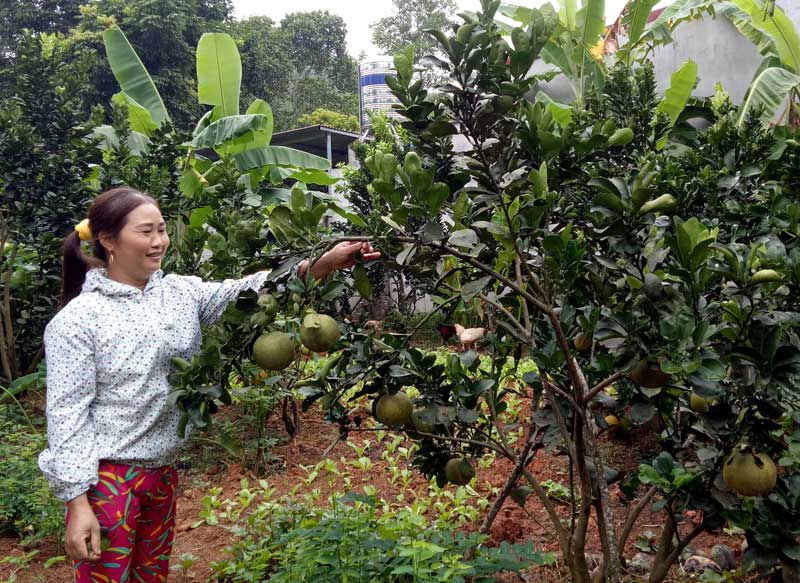
(HBO) - Recently, the province has implemented many policies to care for poor households and policy beneficiaries. In particular, the preferential credit channel of the Government is considered an important and effective solution to implement the goal of hunger eradication and poverty alleviation and new rural construction in the area.

From preferential loans from the Social
Policy Bank, people in Dan Ha commune (Ky Son) have invested in developing
production and sustainably alleviating poverty.
With the partial fiduciary lending method
through socio-political organizations, the Social Policy Bank and the other
social organizations have built up a network of savings and loans to 100% of
villages, hamlets and population groups in the province to gather the poor households and the ones with a poverty
threshold and the policy beneficiaries who need to borrow money from Social
Policy Bank to invest in developing production, creating jobs and improving
lives. Currently, the associations and unions are managing 2,819 savings and
loans groups, of which 2,632 savings and loan groups do not have overdue debts.
Along with that, there is the network of the fixed transaction points at 210
communes, wards and towns in the whole province helping people easily access
the services of the Social Policy Bank.
Up to now, the Social Policy Bank of the
province has been implementing 16 policy credit programs with the total debit
balance of over 2,931 billion VND and 139,136 customers with the debit balance.
The overdue debt ratio has accounted for 0.14% of total debit balance. In 2018,
the policy credit capital in the province helped 38,700 turns of the poor
households and policy beneficiaries borrow capital to invest in the economic
development and life improvement. The
policy capital has contributed to creating new jobs for 3,063 employees,
helping 207 disadvantaged students get loans to study. It also helps to set up
and repair 9,820 clean water projects, 9,485 sanitation works in the rural
areas, buildi 1,054 new houses for the poor households. Thousands of households
in disadvantaged areas have got loans to develop production and business. The
policy credit sources have given support to the poor household, the ones with a
poverty threshold and ethnic minorities, making themselves with familiarizing with the market mechanism,
commodity production. They have step by step overcome the difficulties to
develop economy, stabilize and raise the quality of life, limiting the black
credit situation, contributing to eliminating the rate of the poverty
households in 2018.
More than just an information technology teacher, Bui Van Nien is an inspiring figure who has nurtured the scientific curiosity and creative spirit of students in Vietnam’s ethnic minority communities.
Da Bac is the most disadvantaged mountainous district in Hoa Binh province, with ethnic minorities accounting for about 90% of its population. Over the past years, the district has mobilised resources to implement ethnic policies to improve the quality of life of local people.
In recent years, Hoa Binh province has consistently prioritised the protection, care, and education of children, particularly those from ethnic minorities and disadvantaged backgrounds, by creating a safe, healthy, and nurturing environment for their all-round development.
The Steering Committee for Tobacco Harm Prevention and Control of Hoa Binh province, in coordination with the Tobacco Harm Prevention and Control Fund, held a ceremony on May 28 in response to the World No Tobacco Day (May 31) and the National No Tobacco Week (from May 25 to 31). The event was chaired by Nguyen Van Toan, Standing Vice Chairman of the provincial People’s Committee and head of the Steering Committee.
Since 2021, the Center for Industrial Promotion and Industrial Development Consulting (CIIDC) under the Department of Industry and Trade has been implementing a school lighting model as part of the plan for using energy efficiently and economically in Hoa Binh Province in the pẻiod of 2021 - 2025. This model not only aims to improve the learning conditions and enhance the education quality, but it also promotes the message of energy saving, energy security, environmental protection and contributes to the goals of socio-economic development.
In the 2024 - 2025 school year, the entire Hoa Binh provincial education sector includes 520 educational institutions and schools. Among them are 13 ethnic boarding schools with 153 classes and 4,487 students. Four of these schools have met national standards, reaching 30.7 percent.



